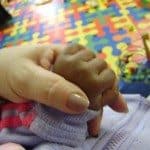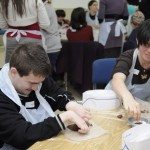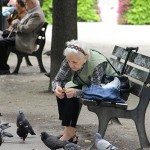B’tayavon! (Hearty Appetite!)
 Finally, we had today our first healthy meal in the “Gan”… Every day the kids will have for lunch meat or chicken + carbohydrate (potatoes, rice, couscous…) and vegetables.
Finally, we had today our first healthy meal in the “Gan”… Every day the kids will have for lunch meat or chicken + carbohydrate (potatoes, rice, couscous…) and vegetables.
Several weeks ago we reported on the good work of one of our new grantees, Tzimaon which was started by Shlomo Artzi and his wife Michal. This all-volunteer organization believes that those blessed with more economic opportunities should help people who struggle daily to get by. To each of them, this is what Israel should represent. When we learned that the group was involved in a project to help improve the lives of the young African refugee children attending day-care centers in Tel Aviv we agreed to fund nutritious food that would replace the pasta and ketchup meals the kids were currently eating.
This morning Carmit Elad, the Tzimaon volunteer spear-heading this effort wrote us with this brief report. The kids were not the only ones happy. The Good People Fund is happy, too!
Healthy meals will no doubt make for healthier kids.

 Pasta and ketchup. What kid wouldn’t welcome a daily diet of these two nutritionally “challenged” food items? For the young children who attend one of the dozens of “gans” or daycare center (there are more than 60 of them) set up for the children of African refugees throughout Tel Aviv, that is exactly what they eat each day.
Pasta and ketchup. What kid wouldn’t welcome a daily diet of these two nutritionally “challenged” food items? For the young children who attend one of the dozens of “gans” or daycare center (there are more than 60 of them) set up for the children of African refugees throughout Tel Aviv, that is exactly what they eat each day. The NY Times article that described the life of one of these children inspired Evan to bring the subject up in one of his social science classes where enthused students decided to raise money to help such children.
The NY Times article that described the life of one of these children inspired Evan to bring the subject up in one of his social science classes where enthused students decided to raise money to help such children. Rabbi Shaul Inbari, whose CP has left him disabled and confined to a wheelchair, often dreamed of coming home each day to a warm and loving partner. Loneliness was forever with him as the years passed. When he one day shared his frustration of living a life of isolation with his dear friend Shalomi Eldar, Shalomi challenged him by suggesting that they publicize a gathering for people with disabilities. Surely there were others frustrated by the lack of social opportunities available for disabled people. Within hours both were inundated with calls of interest and their first meeting attracted more people than they could comfortably accommodate. Clearly these two trailblazers had uncovered a deep unmet need in the world of disabled people. In 2012 they organized Inbar as an official amuta to offer social events as well as courses in relationships and social integration. The group has been bolstered by the efforts of several matchmakers and other volunteers who work hard to promote Inbar’s goals, and today has more than 400 people with a wide range of disabilities registered in their database.
Rabbi Shaul Inbari, whose CP has left him disabled and confined to a wheelchair, often dreamed of coming home each day to a warm and loving partner. Loneliness was forever with him as the years passed. When he one day shared his frustration of living a life of isolation with his dear friend Shalomi Eldar, Shalomi challenged him by suggesting that they publicize a gathering for people with disabilities. Surely there were others frustrated by the lack of social opportunities available for disabled people. Within hours both were inundated with calls of interest and their first meeting attracted more people than they could comfortably accommodate. Clearly these two trailblazers had uncovered a deep unmet need in the world of disabled people. In 2012 they organized Inbar as an official amuta to offer social events as well as courses in relationships and social integration. The group has been bolstered by the efforts of several matchmakers and other volunteers who work hard to promote Inbar’s goals, and today has more than 400 people with a wide range of disabilities registered in their database. So many of the great programs we support focus on hunger, whether it be here in America or in Israel. Sometimes, we think that the “din” created by this crisis goes largely unnoticed just because it is always there…a fact of life. Perhaps it is something so overwhelming that we just ignore it or push it out of our consciousness.
So many of the great programs we support focus on hunger, whether it be here in America or in Israel. Sometimes, we think that the “din” created by this crisis goes largely unnoticed just because it is always there…a fact of life. Perhaps it is something so overwhelming that we just ignore it or push it out of our consciousness.



